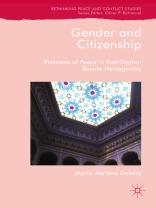This book examines the remaking of women’s citizenship in the aftermath of conflict and international intervention. It develops a feminist critique of consociationalism as the dominant model of post-conflict governance by tracking the gendered implications of the Dayton Peace Agreement. It illustrates how the legitimisation of ethnonationalist power enabled by the agreement has reduced citizenship to an all-encompassing logic of ethnonational belonging and implicitly reproduced its attendant patriarchal gender order. Foregrounding women’s diverse experiences, the book reveals gendered ramifications produced at the intersection of conflict, ethno-nationalism and international peacebuilding. Deploying a multidimensional feminist approach centred around women’s narratives of belonging, exclusion, and agency, this book offers a critical interrogation of the promises of peace and explores individual/collective efforts to re-imagine citizenship.
Содержание
1. Revisiting Dayton: Unfinished (Feminist) International Relations.- 2. Trajectories of Women’s Citizenship from Socialism to the Bosnian War.- 3. The Politics of Not/Belonging: Making sense of Post-Dayton exclusions.- 4. Women’s personal narratives and the multi-layered legacies of war.- 5. Collective visions for citizenship and challenges of transversal politics as practice.- 6. Is another citizenship possible? Hopeful political practices in the Post-Dayton impasse.- 7. Conclusions.
Об авторе
Maria-Adriana Deiana is a Lecturer in International Relations in the School of Law and Government, Dublin City University, Ireland. Her research draws on feminist approaches to war and security. It focuses on gender dynamics of conflict and post-conflict transformation, the Women, Peace and Security (WPS) agenda, EU border politics and peacekeeping.












